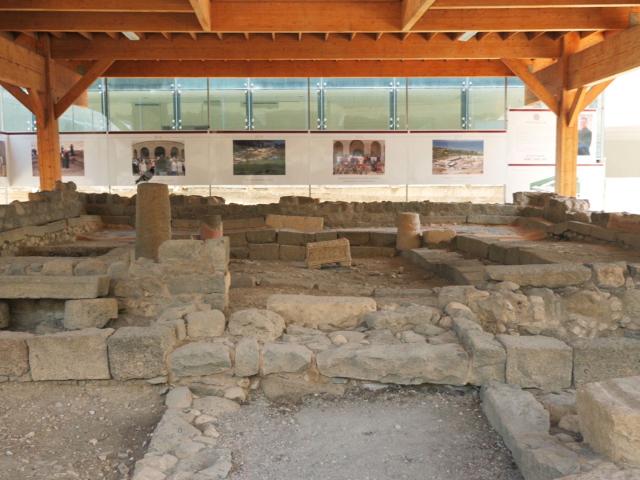Magdala Stone Comes Home to Israel's Galilee: 'A Crossroads of Jewish and Christian History'
JERUSALEM, Israel – A unique stone from an unearthed synagogue where Jesus could have prayed has returned to its home in the Galilee and the Magdala stone is expected to be a special draw for visitors.
Deemed by experts as one of Israel’s most important discoveries, the Magdala stone spent years with the Israel Antiquities Authority (IAA) and then went on an international tour with showings in New York and Rome.
“I, myself, with some other workers here, put [the stone] in the truck that [removes] it from the site. So, I said, ‘Bye, see you soon’ to the stone in the beginning of January 2010. So, to see the stone coming back today is a big joy,” said Father Juan Solana, Director of the Magdala center.
Dozens gathered recently at the Magdala Center Hotel for the return of the Magdala Stone.

Just outside the hotel is the site where archaeologists uncovered the original stone in 2009. A replica of the stone stands today in the exact location in the ancient synagogue where it was found.

“The director of [the] Antiquities Authority at the time of the discovery, he came, he was looking around,” Father Solana told CBN News. “He said, ‘the Magdala stone has to come back here because this synagogue without the stone is like a beheaded body.’”
Known today as Migdal, Magdala was a city on the Sea of Galilee and known as the home of Mary Magdalene from the New Testament.
In 2005, Father Juan Solana initiated the Magdala project to highlight Jesus’ ministry in the region and honor women of faith. They broke ground in 2009, and the center now includes an archaeological park, a chapel, and a hotel on the shores of the Sea of Galilee.
Father Solana said he realized when he was about to buy the land that the center couldn’t belong to the Catholic Church, but would belong to all Christians, because as the home of Mary Magdalene it would be precious.
“But when we discovered the synagogue and the entire town of Magdala from the first century I said, ‘It belongs not [only] to all Christians, but also to the Jewish people,’” he said.
Archaeologist Mordechai Aviam, from the Land of Israel Studies Department of Kinneret College, was one of the first to propose that the Magdala stone was one of a kind.
“Magdala Stone is an unicum. It's a unique object. It is [an] unknown collection of what I think to be Jewish symbolism, which [symbolizes] the Temple in Jerusalem,” Aviam told CBN News.
Aviam believes the stone held deep meaning for Jewish worshippers who couldn’t make the weeks-long trek to Jerusalem and back. He believes it was used to hold the Torah scroll (first five books of the Bible) while it was being read.
***Please sign up for CBN Newsletters and download the CBN News app to ensure you keep receiving the latest news from a distinctly Christian perspective.***
“They looked at the stone, they felt Jerusalem and the Temple and God in their hearts. And that's the meaning of this stone,” Aviam said.
Father Eamon Kelly, Vice Director of the Magdala Center says for him Magdala is all about the people who come to visit.
“I'm always engaging the people who come and really a cross-section of humanity comes here. And we see that the archeology here is a crossroads of Jewish and Christian history, but that the spirit of Magdala is a crossroads for everybody,” Father Kelly told CBN News.
Father Kelly says he believes the return of the original stone will draw people here like a magnet like never before.
“Magdala is like an oasis of encounter,” he said. “And I think this is going to give that further impulse because people will come, and this will create conversation, dialogue, and quest for understanding. And that will be an opening to understanding the past and the present. And that's a pathway for the future.”






